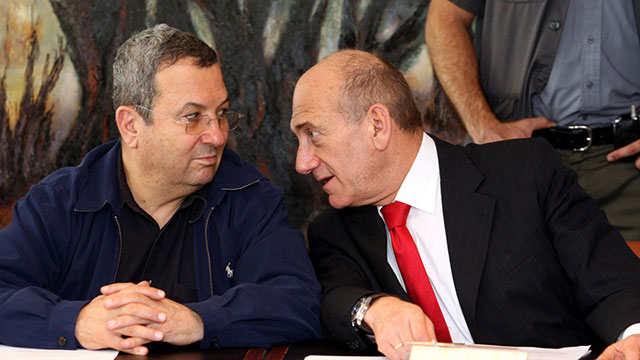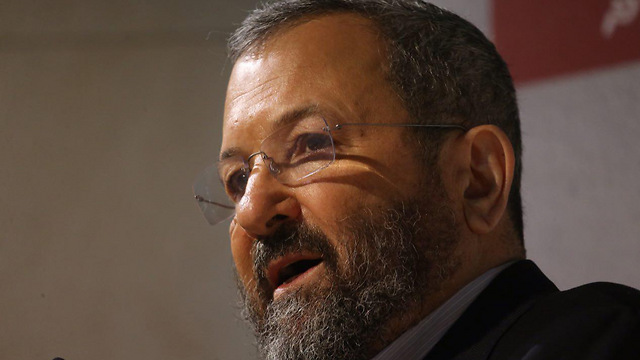
Barak's version: Syrian reactor strike plans were insufficient
Denying accusations that he pushed for a delay in the military operation against the Syrian nuclear reactor for internal political reasons, former defense minister attacks then-Prime Minister Olmert; 'That's the difference between a man who never planned an operation and a man who did it dozens of times,' he says.
Barak didn't share the other officials' sense of urgency and tried to curb their enthusiasm, arguing that the strike could wait. Later, he was accused of doing so for internal political considerations. According to his political rivals, he wanted to wait for the release of the Winograd Commission's report on the failures of the Second Lebanon War, replace Prime Minister Ehud Olmert and take credit for the operation.
In an interview to Ynet, however, the former defense minister denies the accusations and provides a different version, harshly criticizing the former prime minister.
"The reactor strike issue was definitely one of the reasons I thought I should assume office quickly," he says. "I knew the issue was being taken care of, I didn’t know the timetable, where they were in terms of preparations and how close they were to execution, but I thought, with all modesty, that I could contribute to the preparation and decision-making process. That's one of the reasons why I insisted on assuming office quickly."
You seemed very passionate about the issue, because you sent a fax to the Prime Minister's Residence, announcing, 'I'm the defense minister,' in the middle of a discussion about the reactor at the Prime Minister's Residence.
"No, I didn’t know there was a meeting taking place at the time. I sent a fax to Amir (Peretz) and told him that, as Labor chairman, I was intending to replace him as defense minister and I expected it to happen as soon as possible.
"I took office in mid-June, and discovered that we were racing towards a possible execution (of the plan to attack the reactor). But I looked at the plans and found two things, which I believed were very important, missing.
"The minimum requirement from any plan—and there were two plans on the table by then—is to have absolute certainty that the reactor would be destroyed and that the operation wouldn’t lead to a major clash with the Syrians, which could lead to a clash with Hezbollah. And in case of deterioration, we should be prepared, which means preparations in the Northern Command, preparations in the home front, IDF preparations in terms of precision-guided ammunition, critical spare parts. And in this sense, I kind of poured cold water on this speed.
"My opinion was that the two plans on the agenda at the time didn't meet the requirements I just described. About the first plan, you couldn’t say with full confidence that it would destroy the reactor, although you could say with a lot of confidence that it wouldn’t lead to war. As for the second plan, you could say with absolute confidence that it would destroy the reactor, but there was a reasonable chance, not a high chance but a real chance, that it would lead to a wide-scale confrontation with Syria and perhaps with Hezbollah as well."
They're also saying that as the operation drew closer, you kept trying to stop or postpone it.
"These are just made up fabrications in hindsight. Some of the tensions may have developed as a result of the contradiction or gap between Olmert’s urgent handling of the affair and the planned slower pace that I had demanded. I felt this tension and the fact that Olmert's associates started mumbling, 'Barak is stopping us. Perhaps he wants to…' I don’t know what.
"I used to say at the beginning of every meeting, ‘This reactor must be destroyed. And I will say it at the end too, that this reactor must be destroyed. If I forget to say it in the middle, remind me.' Because it was clear to me that there would be attempts to manipulate these things. That's a false claim."
Barak directs his criticism at Olmert: "A grownup person who got to watch this from the side said to me, 'Listen, that's what happens in an encounter between a certified slipshod person and a perfectionist professional, between a man who never planned anything and never commanded an operation and a man who did it dozens of times over the course of decades."
But military officials are also saying, 'Ehud Barak did things that should not have been done. He pressured the political echelon, government ministers.'
"There is no contradiction. With all due respect to military officials, at the end of the day it's our responsibility, the political echelon."
So everyone's making this up?
"In another discussion I did say, after hearing the terrifying—I would almost say apocalyptic—account of what would happen, God forbid, if it were leaked and we wouldn’t manage to do it for some reason. I didn’t like the apocalyptic discussion of ‘who knows what will happen.’”
Who was it led by?
“It usually comes from prime ministers. It came from Olmert at the time. By the way, several years later I was more radical than (current Defense Minister Avigdor) Lieberman and Bibi (Prime Minister Benjamin Netanyahu) on what should be done about Iran."
You're basically saying that if things had developed without Ehud Barak, this whole thing might have ended in a disaster.
"No, there's no way of knowing how it would have ended. It simply would have taken a wrong track. A country that embarks on this kind of operation must ensure that the plan being executed destroys the reactor with absolute certainty and doesn’t lead to a confrontation. Imagine what would have happened had it not destroyed the reactor. It could have happened."













